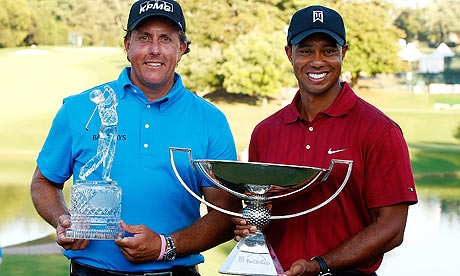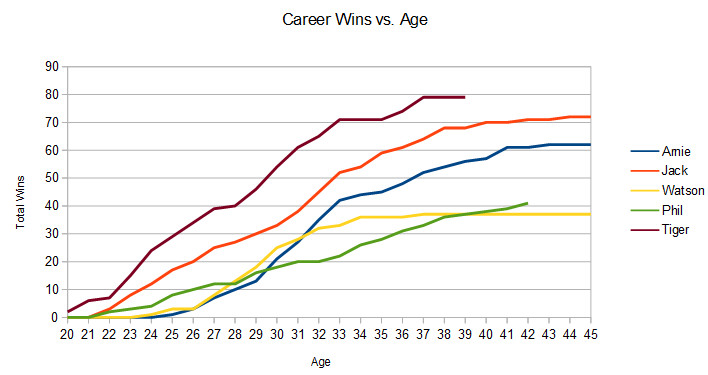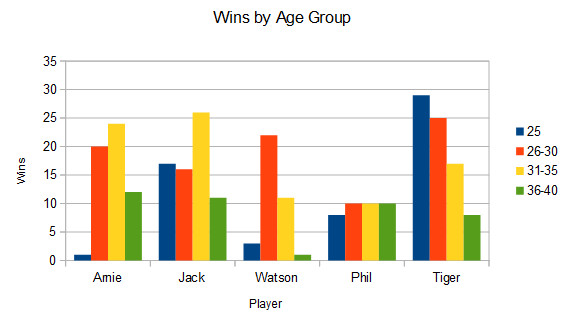We remember the greats at their greatest. We tend not to remember the struggle to reach that greatness, and we most certainly don't recall very well that greats eventually stop being great. The best were always that way, as we see it, just that they hadn't yet reached their pinnacle and they voluntarily stepped aside for the future.
In golf, it's even harder to parse out the time frame that made a player so spectacular -- and the moment they, as Arnold Palmer described to Michael Bamberger in his new book "Men in Green," "lost the edge." Golfers don't retire; they just fade away, either into a role as grandparent of the game or back among the ranks of the rest of us who wish we were so much better.
That's why it's hard to accept that Tiger Woods has peaked. In fact, he did long ago. However, we grasp on to his most dominant days, or even his really good Hank Haney days, and hope that guy is driving down Magnolia Lane in two weeks. Even if a guy named Tiger is in the field, that guy we imagine won't be competing. He's left to the ages.
Jack faded. Arnie faded. Watson, Seve, Casper and every other great faded. But we don't recall the lean years. Data does, though. The numbers tell us when a player was at their best and when they lost -- or started to lose -- what made them so special.
So, inspired by Palmer's comment and a worthwhile read on the subject at Bleacher Report, we wanted to offer a look at the dulling edge.
For the experiment, we stuck to PGA Tour players and picked a few different types of legends. So we went with Palmer, Jack Nicklaus, Tom Watson (because he won a lot of majors, but not as many Tour events), Phil Mickelson and Tiger Woods. We looked at how they tallied wins throughout seasons and their respective ages, as well approximately 50-start increments to see when these greats were at their most dominant.
As Woods has said repeatedly, Father Time is undefeated. He's already beaten Woods -- at least in terms of consistent greatness. And while Father Time isn't exact, there's a clear range where to expect him.
The chart makes it pretty clear: few golfers escape their 30s with their talent intact. Nicklaus topped out at 38 as has, to date, Phil Mickelson. Tiger Woods' best days appear to have ended at 37 -- and it's easy to argue sooner, but that would either be an indictment of Sean Foley or giving too much credit to Y.E. Yang. Tom Watson was the minor outlier in this group, peaking at 34. Palmer appeared to peak at 37, but then he had a four-win season when he was 41, so maybe it was a false positive.
It gets more interesting looking at players by five-year stretches. Nicklaus and Woods won big in their early 20s, which set them apart from the other three. Palmer, Watson and Mickelson won a combined 12 times as a pro (Mickelson would add a 13th win as an amateur in 1991) before turning 26. Nicklaus won 17 times. Woods won an astounding 29 times.
All five golfers were great between 26 and 30 and from 31 to 35. However, Palmer and Nicklaus were most prolific in the latter range, winning a combined 50 times in that span -- Nicklaus with 26, Palmer with 24. As Woods has aged, he's won less. Tom Watson was showing signs of fading before turning 31. Curiously, Phil Mickelson has basically won the same number of tournaments in each five-year period.
What is probably most interesting, however, is looking at the stretches of approximately 50 starts where each of these five players did their best work.
For Nicklaus, between professional starts 199-253, he won 34 percent of the time. For every other 50-ish-start stretch except from start Nos. 350-400, Nicklaus won at least a 15-percent clip.
Arnold Palmer's career was made by a 90-start run from Nos. 154-246. He won 29 times, or 31 percent, of those 93 starts. With the exception of his second peak from start Nos. 294-362, where he won at a 15 percent clip, Palmer never won at more than an 11-percent rate for a 50-ish-start stretch.
Tom Watson was a shining start from start Nos. 150-297, winning 30 of his 37 titles, in that 148-tournament stretch. He otherwise was a total crapshoot to win.
As the age-based data suggested, Phil Mickelson is oddly consistent -- except for the prototypical stretch of his early 30s, where most players are expected to peak. Mickelson was his worst from 30-32, winning at just a 4 percent rate from start Nos. 213-261. However, for the next 143 starts, Mickelson won at a nearly 12 percent pace.
Tiger Woods is a very interesting case, primarily because he plays so rarely. Woods finally made his 300th professional PGA Tour start last year at the age of 38. Compare that to all other players in this study. Palmer and Nicklaus passed the 300 mark at age 36. Watson and Mickelson were grinders by comparison, hitting 300 at 34. All four of the other players -- Watson, in particular -- played so much more in their 20s before slowing down to a comfortable 20-23-event schedule. Woods' high-water mark was 21 starts in 1997, '99 and 2005. So he has spaced out his starts more.
Woods has basically never won at less than a 15-percent clip for any 50-start stretch. He's the only guy on this list not to dip into the single digits at any point, though Nicklaus only did so at a point well past his peak. What's remarkable is a pair of stretches for Woods. From start Nos. 50-109, Woods won at a 37 percent rate. From starts 165-200, he won almost 39 percent of the time. That's unreal.
However, what has perhaps saved Woods' winning percentage in more recent years is, sadly enough, injury. Woods played little in 2010, as his marriage was ending, and in 2011 and '14 when he was hurt. He didn't play through pain, so he didn't worsen his record.
So, yes, Woods is right. Father Time eventually wins, but by the time a great realizes they're fading, they've already lost that battle.




Add Comment